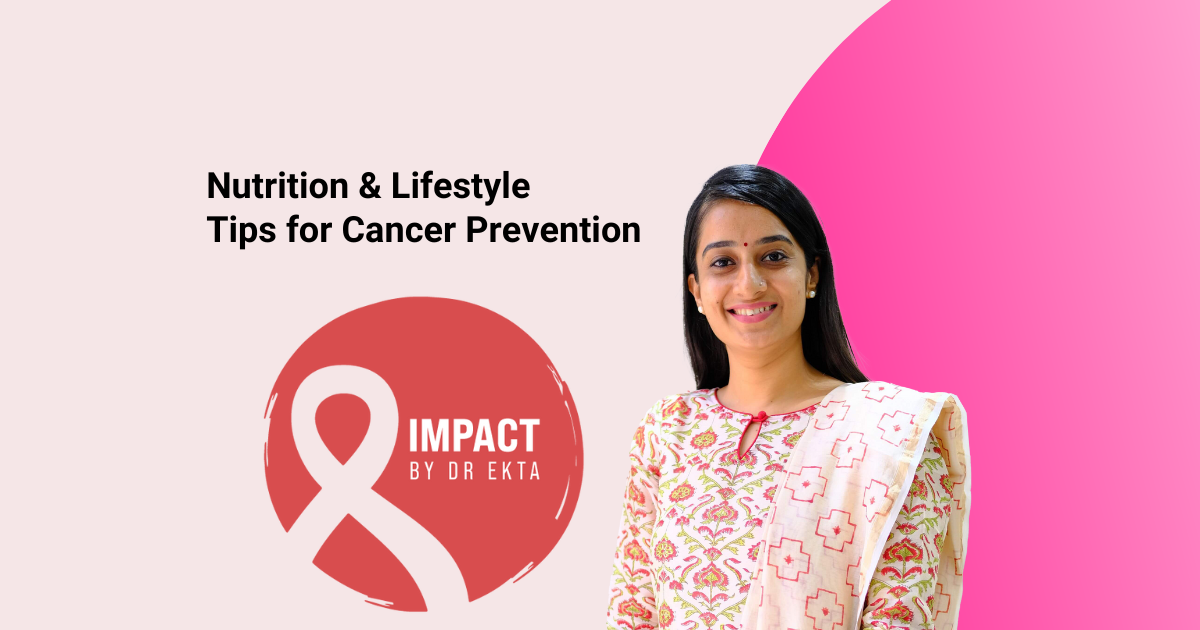The role of nutrition and lifestyle in cancer prevention is very important topic yet many a times left untouched. While there is no guaranteed way to completely eliminate the risk of cancer, adopting a healthy lifestyle can significantly lower the chances of developing the disease. In my years of experience, I have seen how simple changes in daily habits can make a big difference in overall health and well-being.
Understanding the Link Between Lifestyle and Cancer
Research has shown that nearly 30-50% of cancer cases could be prevented by making healthier lifestyle choices. Factors like poor diet, lack of physical activity, obesity, smoking, and alcohol consumption contribute to an increased risk of cancer. On the other hand, a balanced diet and an active lifestyle can support the body’s defense mechanisms and reduce inflammation, which plays a key role in cancer development.
Nutrition Tips for Cancer Prevention
1. Eat a Plant-Based Diet
A plant-based diet is rich in vitamins, minerals, fiber, and antioxidants, which help protect cells from damage that can lead to cancer. Include:
- Fruits and vegetables: Aim for at least 5 servings a day of colorful fruits and vegetables like berries, carrots, spinach, and tomatoes.
- Whole grains: Replace refined grains with whole grains like brown rice, quinoa, and whole wheat bread.
- Legumes and beans: Chickpeas, lentils, and black beans provide essential nutrients and fiber to support digestion and overall health.
2. Reduce Processed and Red Meat Consumption
Studies suggest that processed meats (such as bacon, sausages, and deli meats) and excessive consumption of red meat can increase the risk of colorectal cancer. Try to limit processed meats and opt for lean protein sources like chicken, fish, tofu, and nuts instead.
3. Choose Healthy Fats
Not all fats are bad for health. Healthy fats can actually reduce inflammation and support cell health. Include:
- Olive oil and avocado as sources of heart-healthy monounsaturated fats.
- Nuts and seeds like almonds, walnuts, and flaxseeds.
- Fatty fish such as salmon and sardines for omega-3 fatty acids, which have anti-inflammatory properties.
4. Limit Sugar and Processed Foods
A diet high in refined sugars and processed foods can lead to obesity and insulin resistance, both of which are linked to a higher risk of certain cancers. Reduce sugary drinks, candies, and ultra-processed snacks, and opt for natural sources of sweetness like fruits.
Lifestyle Tips for Cancer Prevention
5. Maintain a Healthy Weight
Obesity is a significant risk factor for various types of cancer, including breast, colon, and pancreatic cancer. Maintaining a healthy weight through a balanced diet and regular exercise can help lower cancer risk.
6. Stay Physically Active
Regular physical activity boosts the immune system, improves digestion, and helps maintain a healthy weight. Aim for at least 150 minutes of moderate exercise per week, such as:
- Walking or jogging
- Yoga or stretching exercises
- Strength training or resistance exercises
7. Avoid Tobacco and Limit Alcohol
Smoking is the leading cause of lung cancer and contributes to many other types of cancer. Quitting smoking is one of the best steps you can take for cancer prevention. Similarly, excessive alcohol consumption is linked to liver, breast, and esophageal cancer. If you choose to drink, limit alcohol intake to moderate levels—one drink per day for women and two for men.
8. Protect Yourself from Harmful Sun Exposure
Excessive exposure to ultraviolet (UV) radiation from the sun can increase the risk of skin cancer. To protect yourself:
- Wear sunscreen with SPF 30 or higher.
- Avoid tanning beds and prolonged sun exposure.
- Wear protective clothing, hats, and sunglasses when outdoors.
9. Get Regular Screenings and Checkups
Early detection of cancer increases the chances of successful treatment. Make sure to:
- Schedule regular screenings for breast, cervical, colorectal, and prostate cancer based on your age and risk factors.
- Perform self-examinations, such as breast self-exams and skin checks, to detect any unusual changes.
- Visit your doctor if you notice any persistent symptoms like unexplained weight loss, lumps, or prolonged fatigue.
10. Manage Stress and Prioritize Mental Health
Chronic stress can weaken the immune system and contribute to cancer risk. Practicing stress management techniques like meditation, deep breathing, and engaging in hobbies can help maintain overall well-being. Prioritizing mental health through social connections and a positive mindset is equally important for a healthy life.
Conclusion
As an oncologist, I strongly advocate for the power of prevention. Making small but meaningful changes in diet and lifestyle can have a significant impact on overall health and cancer risk. Cancer prevention is not about eliminating every risk but about reducing exposure to harmful factors and strengthening the body’s natural defense system.
By incorporating nutritious foods, regular exercise, and healthy habits, we can take proactive steps toward a cancer-free future. Remember, every positive change counts, and it’s never too late to start living a healthier life!

